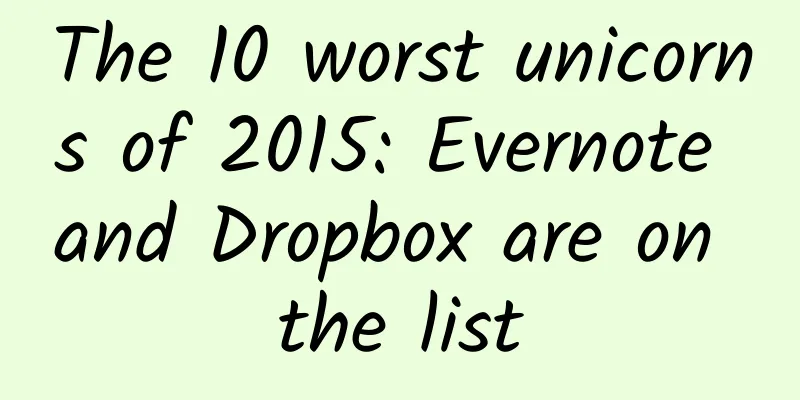The 10 worst unicorns of 2015: Evernote and Dropbox are on the list

|
American technology blog VentureBeat wrote an article today, counting the ten worst-performing unicorns in 2015. Evernote and Square were both on the list. If you get enough venture capital, you may become a unicorn, but this does not guarantee that you will ultimately succeed. But that’s good news for the journalists writing their annual top 10 worst unicorns. The task of finding bad unicorns seems to have become very easy, because almost all the startups we are familiar with are unicorns, so there seems to be a rich selection. However, it is still not easy to complete this work, because there are too many companies to be screened. How to rank the worst conditions of different companies? In addition, another issue should be considered, the so-called "worst" itself contains many subjective factors. Should we compare them based on their financial performance or the extent of their valuation decline? But one thing is certain: this job will get easier over time. According to TechCrunch, there are 156 unicorns in the world, with Uber at the top with a valuation of $51 billion. But since 2011, only 21 unicorns have successfully exited, either through IPOs or through mergers and acquisitions. The huge gap between these two data has dug out a "Unicorn Death Valley", and it is expected that more and more unicorn corpses will pile up here in the next few years. Here are the 10 worst-performing unicorns of 2015: 1. Fab (design product e-commerce) The real problem with Fab is that it's hard to say that its decline began in 2015, because the company seemed to have entered slow motion a long time ago. But the company was sold for $15 million in 2015 - before that, they had raised a total of $336 million at a valuation of $1.7 billion. So, we still classify it as the worst unicorn of 2015. 2. Evernote (Cloud Notes) When some people began to question whether Evernote would be the first unicorn to fall, we should have known that this year would not be easy. But the company's replacement of CEO and layoffs of 5% of employees were still quite unexpected. Things started to deteriorate, and the criticism from the outside world gradually increased. 3. Good Technology (Mobile Apps) Good Technology once raised $291 million and was valued at $1.2 billion. But this year, BlackBerry acquired the company for $425 million. This raises two questions. First, the final acquisition price was lower than the previous financing valuation. Second, it was acquired by BlackBerry. You know, BlackBerry is already in a difficult situation - it can't save itself! 4. LivingSocial (Group buying website) First, the company is still around. They have a cumulative valuation of $935 million and have raised $15.1 billion. The company laid off 200 people this year and 400 people in 2014. People had expected the company's layoffs last year to be a strategic adjustment. Now there is no sign of this once hot company. 5. Pure Storage (Data Storage) The company went public this year at a market cap of $3.1 billion. Looks good. But the enterprise storage company had previously raised $470 million at a valuation of $3.23 billion. That's a poor showing. The company could end the year slightly below its IPO price. Many are still bullish on the company's long-term prospects. But the IPO clearly didn't live up to late-stage investors' expectations. 6. Gilt Groupe (apparel e-commerce) First, the company laid off 45 employees in October in an effort to become profitable. Whenever a startup says it's working to turn a profit, it's a bad sign. Then, in December, the company announced that it was in talks to sell for $250 million. For a company that was once valued at $1 billion, this is a disappointing fall, and they've clearly had a bad year. 7. Dropbox (Cloud Storage) The company raised $600 million in funding and was valued at $10.35 billion. But as storage prices fell rapidly, the company began to expand its product categories. But they subsequently reorganized and shut down Mailbox, which they acquired for $100 million, and their own Carousel photo app. Now, people are beginning to worry about Dropbox's future development, and its competitor Box's lackluster IPO is not helping. 8. Box (Cloud Storage) Box, which raised $558 million in venture funding and was valued at $2.4 billion, went public earlier this year after several delays at a valuation of $1.67 billion. Although it had a good first-day gain, the stock price has since fallen and has remained near the IPO price of $14. With Google and Microsoft both trying to expand into the enterprise cloud computing market, 2016 will definitely be tough for Box and Dropbox. 9. Theranos (Biotech) This one is purely subjective. After years of PR, the $9 billion valuation of the blood testing system company received positive media coverage. However, the Wall Street Journal wrote a series of investigative reports on Theranos, trying to uncover their true colors. Although the company launched a series of defenses, it decided to stop using blood testing products in certain situations. At the same time, US federal regulators also decided to intervene. 10. Square (Mobile Payments) Square is probably the most controversial company on this list. Square went public in November at a $3.6 billion valuation. The IPO was supposed to be a win, but there was a lot of debate about whether the company's late-stage investors benefited. Square first cut its IPO price (bad thing) but compensated late-stage investors with a lot of stock (good for investors, not good for the company), but then the stock rose on its first day of trading (everyone is happy). The company's stock price has basically remained flat since then, which is also a win because most tech stocks fall quickly after IPOs. But don't forget: Square's IPO showed that the public market will no longer be the scapegoat of the private market. That's why I included Square on this list. |
<<: 26 letters review Apple's year: from Admire to Zenith
>>: ARM launches new GPU designed for wearables and IoT
Recommend
For WeChat editors, how can you write social copy that will increase rapidly in forwarding!
Copywriting in the WeChat era is really tiring an...
Today is Minor Cold | The plum blossom, a symbol of winter, is actually a southern plant?
The cover image and the images in this article ar...
Why do you spend so much money but the advertising effect is still so poor?
John, the founder of Ogilvy & Mather, express...
Summary: All the AR/VR/3D technologies and developments you should know
We are all so tired of hearing the words 3D and &...
How to reduce user churn through effective operational activities?
The “Double 12” promotion kicked off the year-end...
Overall planning scheme for Tik Tok short video operations!
Tik Tok short videos are very popular, and both i...
Geckos' superpower of "regenerating severed limbs" inspires human "regenerative medicine"
Do you still remember the little gecko who lost h...
Create a home theater, Sony HT-S350 soundbar comprehensively enhances your viewing experience
There is no doubt that watching TV is the most im...
Which is more terrible, blindness or deafness?
What is the world like for the blind and the deaf...
Japanese smart TVs are criticized: buying a large display at a high price
With excellent user interface and massive content ...
Summary of iOS Graphics Programming
iOS can use three APIs (UIKIT, Core Graphics, Ope...
Daily Market Review Brother Saturday Column Understanding Leading Stocks 2020-2021 Practical Tutorial Updates
Daily Market Review Brother Saturday Column Under...
iPhone 6 has not yet received China's network access license. Apple refuses to comment
Apple Inc's iPhone 6 has passed a key regulat...
9 Tips for Facebook Ads Creatives!
Have you ever experienced your Facebook ad perfor...
How can the reputation score of Douyin’s sales promotion be improved? How to improve the low reputation score of Douyin sales?
Whether individual users or corporate users, ever...









